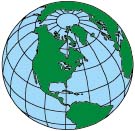
Day 2,3,4 each week
Goals:
2. Students will learn various aspects about their island based on what types of things they research which may include location, people, history, culture, or other areas.
3. There will be a shift of locus of control in the classroom with the teacher as a facilitator and the students directly involved in their learning process.
Time:
Resources/Materials:
Dengo, Gabriel. The Caribbean Region.
Ratcliffe, Virginia. The Caribbean Heritage.
Lea, Sydney & Schley, Jim. The Caribbean.
Hepworth, Peter. Ocean Girl.
Avi. Bright Shadow.
Avi. Smuggler's Island.
Dexter, Catherine. Safe Return.
Cooper, Susan. Over Sea Under Stone.
Peretti, Frank. Trapped at the Bottom of the Sea.
Christensen, James. Voyage of the Bassett.
O'Dell, Scott. Zia.
Stevermer, Caroline. River Rats.
Pringle, Laurence. Dolphin Man: Exploring the World of Do.
Yolen, Jane. Sea Watch - Book of Poetry.
Galilei, Galileo. Starry Messanger.
Jansson, Tove. Moominpappa At Sea.
Magazines:
Foreign Affairs
World Press Review
World Development
Ethics and International Affairs
Global Finance Journal
International Development Review
Welcome Magazine
Journals:
World Opinion Update
World Politics
Overseas Business Report
International Studies Quarterly
International Organizations
Procedure:
2. Students will be given three hours of class time each week, for the duration of the unit, to work on their research project. This time will include one hour on each of the following days each week - Tuesday, Wednesday, and Thursday. This time may be spent in the classroom, library, on a computer, or in other areas approved by the teacher.
3. During this research time, the students may do what they judge appropriate, with minimal teacher direction. Some options may be to brainstorm possible ideas for the project, including possible categories that are important to cover in the paper and/or presentation, secondly to do research in the library or on the internet, and thirdly begin typing paper into the computer and making revisions.
Assessment:
Rubrics:
3 Student uses important information gathering techniques and resources.
2 Student uses some significant information resources necessary to complete task and some important information gathering techniques.
1 Student uses few relevant information resources necessary to complete the task and a limited number of information gathering techniques.
Main Idea and Support
3 Student clearly communicates the main idea or theme and provides sufficient support and detail.
2 Student communicates the main idea or theme and provides minimal support and detail.
1 Student communicates information as isolated pieces, in a random fashion.
End Product:
3 Student creates a product that clearly meets teacher expectations.
2 Student creates a product that meets one or a few teacher expectations.
1 Student creates a product that does not address the majority of teacher expectations.
Group Goal:
3 Student helps achieve the group's goals and effectively carries out assigned roles.
2 Student helps achieve some of the group's goals, but does not fully carry out assigned roles.
1 Student does not work toward group's goals, or actively works against it.
Curricular Strands:
Science and Math - mapping skills and scales, environmental issues on island nations
Computers - use of computers in finding information on island nation
English - writing of letters and of report, oral presentation of island nation
Cooperative Learning - working in pairs
Possible Extension:
This page submitted by St. Norbert College Ocean Voyagers Program